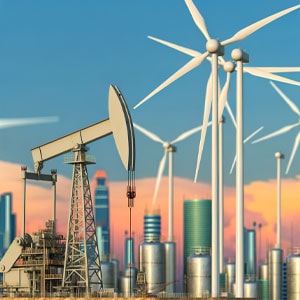Articles
The New Order of the Global Energy Market

The New Order of the Global Energy Market
The global energy market is transitioning from traditional structures to a new order shaped by factors such as climate change, geopolitical fluctuations, technological advancements, and global energy policies. As one of the most critical sectors of the global economy, the energy market directly impacts the growth and development of nations. With the rising global demand for energy and fundamental shifts in production and consumption patterns, a new order in the energy market is emerging. This article examines the factors influencing the transformation of the global energy market’s order.
Factors Shaping the New Order in the Energy Market
1.1. Climate Change and Environmental Policies The climate change crisis and growing public awareness of environmental consequences have driven nations to seek sustainable and eco-friendly solutions. International agreements like the Paris Accord play a pivotal role in guiding energy policies, encouraging countries to reduce carbon emissions and shift toward renewable energy sources.
1.2. Technological Advancements The development of new technologies, such as solar and wind energy and advanced batteries, has enabled energy production to become more efficient and innovative. These advancements have also supported the growth of distributed energy systems and local energy production models.
1.3. Geopolitical Fluctuations and Energy Security Geopolitical tensions, such as disputes between energy-producing and energy-consuming countries, along with the impact of wars on resource supplies, cause significant energy price volatility and shifts in trade flows. These dynamics have heightened the importance of energy security and the stability of supply chains for nations.
Key Players in the Energy Market’s New Order
2.1. The Role of Governments and National Policies Governments are shaping policies to ensure stable and affordable energy supplies for their citizens. These policies include supporting renewable energy resources, creating incentives for reducing energy consumption, and striving for energy self-sufficiency.
2.2. Energy Companies and Their Role in the Energy Transition Energy companies, as key players in the market, focus on developing new technologies and investing in energy production and distribution infrastructure. They also seek ways to reduce carbon emissions and comply with stringent environmental regulations.
3. Challenges and Opportunities in the New Order of the Global Energy Market
3.1. Challenges of Ensuring Sustainable Energy Supply Meeting the demand for sustainable and reliable energy while reducing environmental pollutants poses a significant challenge for nations and energy companies. The transition from fossil fuels to renewable energy requires substantial investments and the establishment of new infrastructure.
3.2. Opportunities in Technological Development and Renewable Energy The global energy market offers numerous opportunities for innovation and the advancement of clean technologies. Solar, wind, and energy storage technologies have created new avenues for investment and job creation. —
4. The Future of the Energy Market and the Outlook for the New Order
4.1. Transition to Renewable Energy Sources With continued technological advancements and increasing environmental commitments, renewable energy sources are expected to play a larger role in meeting global energy needs. Ongoing investments in research and development can reduce the cost of clean energy production and make it more competitive.
4.2. The Role of Hydrogen and Energy Storage Hydrogen and advanced batteries are emerging as critical technologies in energy supply. As the cost of producing green hydrogen decreases and energy storage infrastructure expands, these resources are poised to gain a larger share in the energy market.
5. Economic Transformations and Financial Markets in the New Energy Order 5.1. Economic Impacts of the Energy Transition The shift to renewable energy and reduced dependence on fossil fuels could lead to significant changes in the global economy. Countries reliant on oil and gas exports may face economic challenges due to declining demand for these resources. Consequently, investing in innovative technologies and diversifying economies, particularly in energy-producing nations, has become a top priority.
5.2. Changes in Financial Markets and Investment Impacts Financial markets play a crucial role in funding energy projects. With the growing interest in green investments and carbon reduction initiatives, many global financial institutions are shifting toward financing clean energy projects. Companies and banks are increasingly investing in renewable energy, energy storage batteries, and hydrogen infrastructure.
5.3. Carbon Pricing and Its Impact on the New Energy Order In many countries, carbon pricing is being used as a tool to reduce greenhouse gas emissions. By assigning a cost to carbon emissions, industries are encouraged to adopt cleaner technologies. This shift drives the energy market toward more sustainable and low-carbon practices. —
6. Infrastructure Challenges in the Transition to the New Energy Order
6.1. The Need for Investment in New Infrastructure The transition to renewable energy requires new infrastructure and advancements. For example, the development of smart grids and energy storage systems is essential to manage the variability of solar and wind energy production. Developing countries face significant financial and technological challenges in achieving these infrastructure goals.
6.2. Geographic Distribution of Energy Resources Renewable energies, such as solar and wind power, are not evenly distributed globally. Some countries may have a comparative advantage in producing these energy types. This uneven distribution could create new dependencies and reshape global energy distribution dynamics.
6.3. The Need to Develop Energy Storage Technologies One of the major challenges of renewable energy is its reliance on weather conditions. The development of storage technologies, such as advanced batteries and hydrogen, can significantly mitigate the instability of these energy sources. Progress in this area is essential for establishing the new energy market order. —
7. Future Outlook: Emerging Energies and Smart Technologies
7.1. The Rise of Hydrogen Energy Hydrogen is gaining attention as a clean and reliable energy source. Green hydrogen, produced through water electrolysis powered by renewable energy, offers the potential to replace fossil fuels. This energy source is particularly promising for industries such as transportation and heavy manufacturing.
7.2. The Role of Artificial Intelligence and Data Analytics in Energy Optimization Artificial intelligence (AI) and data analytics can optimize energy consumption and improve the efficiency of distribution networks. These technologies are used to predict energy consumption patterns, manage smart grids, and reduce energy waste. Energy companies leverage these tools to enhance efficiency and cut costs.
7.3. Nuclear Energy and Its Role in Providing Clean Energy Despite safety concerns, nuclear energy remains a viable option for clean energy supply. Next-generation nuclear reactors, with improved safety features and reduced risks, could play a critical role in delivering low-carbon energy.
8. The Role of International Cooperation and Energy Diplomacy
8.1. Importance of Regional and Global Cooperation Due to its inherently international nature, the energy market requires extensive cooperation among nations. Organizations such as the International Energy Agency (IEA) and the United Nations work with countries and international bodies to develop coordinated policies and establish global energy standards.
8.2. Energy Diplomacy and Global Security Energy security is a key factor in the foreign policies of many nations. To secure energy resources and ensure supply stability, countries often seek to strengthen diplomatic relations with energy-producing nations. Energy cooperation can also serve as a tool to resolve regional conflicts and reduce market volatility.
8.3. Technology and Knowledge Transfer in the Energy Sector Developed nations play a crucial role in advancing energy transitions by transferring technology and knowledge to developing countries. This exchange can help build sustainable infrastructure, enhance the use of renewable resources in underserved regions, and create new economic opportunities for all nations. —
9. Social Challenges and Energy Justice in the Transition to the New Order
9.1. Energy Justice and Equitable Access to Resources A significant concern in the transition to renewable energy is energy justice. Many communities, particularly in developing countries, lack access to sustainable energy resources. Global policies must ensure that all nations and communities, benefit from the transition to clean energy.
This includes supporting energy distribution infrastructure in underserved areas and allocating financial resources for clean energy projects.
9.2. Social Impacts of the Transition to Renewable Energy The shift to a new energy order can bring substantial changes to social and economic structures. For example, changes in fossil fuel industries may lead to job losses in certain regions. On the other hand, the creation of new jobs in renewable energy sectors requires education and retraining programs for the workforce.
9.3. Impact on Consumers and Household Economies As energy sources transition toward renewables, short-term fluctuations in energy prices may occur, posing challenges, particularly for low-income families. Supportive policies such as financial incentives and subsidies for clean energy can help alleviate the economic burden on these households, ensuring that the transition to the new energy order does not exacerbate inequalities. —
The Emergence of a New Order in the Global Energy Market
The global energy market stands at the brink of a major structural transformation driven by a combination of environmental, technological, and geopolitical factors. With increasing pressure to reduce carbon emissions and rising demand for renewable energy, nations and energy companies must accelerate their adoption of innovative solutions. While this transition comes with financial, infrastructural, and geopolitical challenges, it also presents significant opportunities to create a more sustainable, inclusive, and efficient energy market. —
Reimagining the Global Energy Market with a Focus on Sustainability and Cooperation The new energy order offers a unique opportunity to reimagine the global energy market, prioritizing sustainability, international collaboration, and the development of clean technologies. Nations and corporations face numerous challenges and opportunities in this process, requiring strategic planning, forward-thinking policies, and targeted investments for success. The transition to this new order can only be achieved through collective effort and a commitment to sustainability and energy justice. If managed effectively, it promises a prosperous and sustainable future for generations to come.
